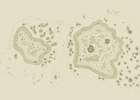Three new genetic variants that increase testicular cancer risk

(PhysOrg.com) -- A study led by the Institute of Cancer Research (ICR) has identified three new genetic risk factors for testicular cancer, taking the number of genomic regions known to be associated with testicular cancer risk to six.
The findings, published online today in 'Nature Genetics', come during Everyman Male Cancer Awareness Month, which aims to increase awareness and funding for vital research into testicular and prostate cancers. The study was funded by the Everyman Campaign, Cancer Research UK and the Wellcome Trust.
Researchers from the ICR, the Wellcome Trust Sanger Institute and the Cancer Research UK Genetic Epidemiology Units in Cambridge and at the University of Leeds scanned the genomes of almost 1000 men with testicular cancer and almost 5000 apparently unaffected individuals. They found that genetic variants in three regions were significantly more common in the men with testicular cancer and confirmed the results in a further 670 men with cancer and 3500 controls.
Men who have any of the variants on chromosomes 5, 12 and 9 have an increased risk of testicular cancer. Within each region, the researchers pinpointed an interesting gene most likely to be involved in causing testicular cancer: the genes are known as TERT, ATF7IP and DMRT1 respectively.
TERT and ATF7IP are important in maintaining the correct length of the ends of chromosomes, which are called telomeres. Shortened telomeres are known to occur in many cancers and genetic variants in TERT have already been linked to other cancers, including lung, bladder, cervical, pancreatic, skin and prostate cancers. The third gene identified in this new study, DMRT1, is pivotal in sex determination and has been implicated in the development of testicular cancer in mice.
Senior author Professor Nazneen Rahman, from the ICR, says: "The genes located in these regions give us clues to the mechanisms by which testicular cancer develops. In time this may allow us to develop new treatment options."
Lead author Dr Clare Turnbull, also from the ICR, says: "This study represents further, important progress towards identifying men who are at increased genetic risk of testicular cancer. Finding those men at highest risk may allow early detection or prevention of the disease."
More information: Turnbull C et al. Variants near DMRT1, TERT and ATF7IP are associated with testicular germ cell cancer. Nat Genet 2010 [Epub ahead of print].















